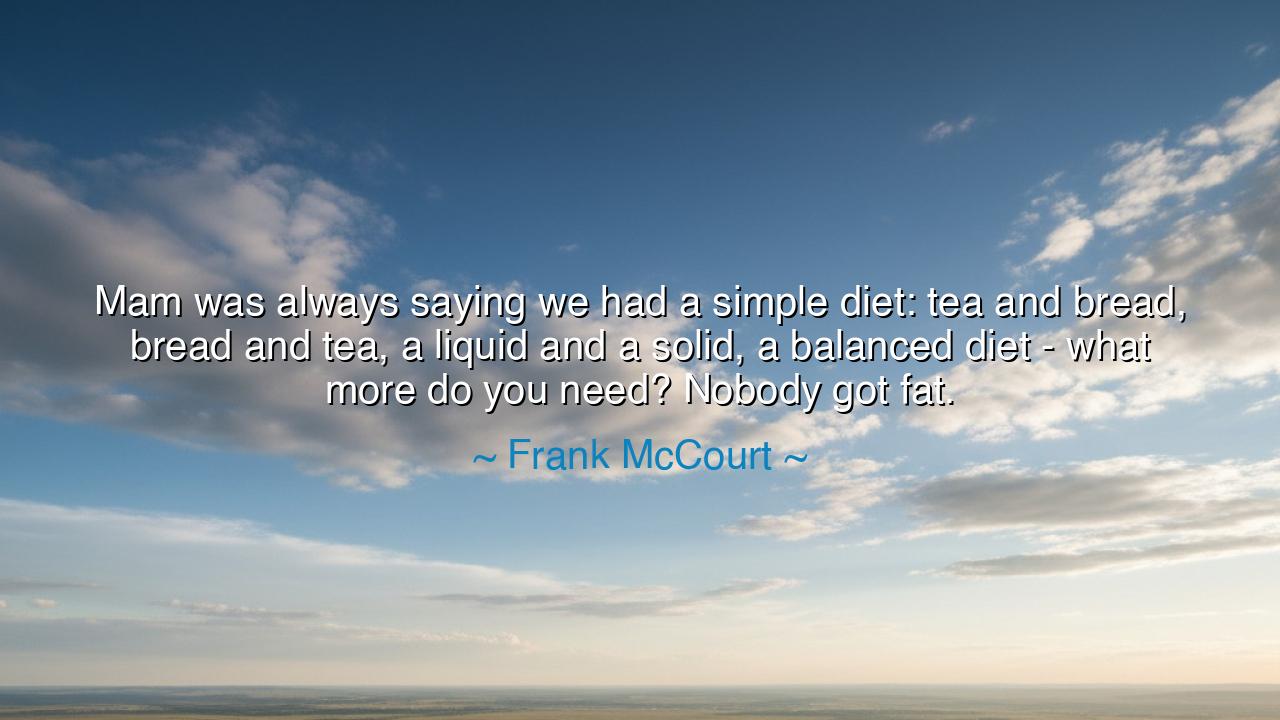
Mam was always saying we had a simple diet: tea and bread, bread
Mam was always saying we had a simple diet: tea and bread, bread and tea, a liquid and a solid, a balanced diet - what more do you need? Nobody got fat.






In the words of Frank McCourt, the teller of sorrows and laughter from the lanes of Limerick, we hear both humor and hardship woven into one: “Mam was always saying we had a simple diet: tea and bread, bread and tea, a liquid and a solid, a balanced diet—what more do you need? Nobody got fat.” These words, born from poverty, are more than mere nostalgia; they are the poetry of endurance. In them lies the voice of a mother who faced hunger with wit, who clothed despair in laughter so her children would not drown in it. Her tea and bread were not a feast of luxury, but of courage—the sacred alchemy of turning little into enough.
In ancient days, the philosophers spoke of the Golden Mean, that noble balance between excess and deprivation. McCourt’s Mam lived this truth not through study, but through survival. She took what the world offered—meager as it was—and found in it the wisdom of simplicity. Her table was not set with abundance, but it was set with love, and love, though invisible, nourishes deeper than any feast. What she called a “balanced diet” was not about food alone; it was about gratitude, about seeing wholeness where others saw want.
The ancients told stories of kings who had everything and yet starved of peace. Consider Croesus of Lydia, whose wealth was said to outshine the sun itself. When his empire fell, and he stood before the flames of his own ruin, he cried out the name of Solon, the philosopher who once told him that true happiness does not come from riches, but from wisdom and contentment. McCourt’s mother, standing in her kitchen with her kettle and her loaf, knew this truth instinctively. Her bread and tea were poor in gold, but rich in meaning.
There is a quiet heroism in such poverty—a steadfastness that the modern world, with all its glittering abundance, has almost forgotten. The simplicity of Mam’s table was not a choice, but a calling. And yet, through her resilience, she transformed necessity into virtue. She did not complain of lack, but instead found balance in the very rhythm of her days: a cup of warmth, a crust of bread, a heart unbroken. To the child, it may have seemed a jest—“a liquid and a solid”—but to the wise, it is a philosophy: that one can live lightly and still live fully.
There is a lesson here, echoing through the centuries: the body does not need much, but the spirit hungers for peace. When we heap our plates and fill our cupboards, we do not always feed that deeper hunger. The ancient Stoics taught that the man who needs little is the richest of all. Frank McCourt’s Mam, in her humble Irish home, lived that wealth daily. Her “balanced diet” was the balance of acceptance and endurance—the strength to live with what is, and still find joy.
And yet, let us not romanticize suffering; rather, let us honor its wisdom. To live simply is not to deny life’s sweetness, but to taste it with awareness. Mam’s words remind us that the truest nourishment does not come from plenty, but from perspective. When we sit at our own tables—laden or bare—we might remember her humor, her strength, her grace under scarcity. She teaches us that gratitude is the seasoning of every meal, and laughter the warmth of every cup of tea.
The lesson for us is thus: seek balance not in what you consume, but in how you live. Let your bread and tea—whatever form they take—be symbols of sufficiency. Do not chase endless variety when peace lies in simplicity. Practice gratitude daily, eat slowly, honor your food, and share what little you have with generosity. In that, you will find the nourishment of the soul that no banquet can provide.
For in the end, nobody got fat, not because they lacked food, but because they carried the lightness of acceptance. To live simply, to find humor in hardship, and to honor life’s smallest gifts—this is the secret that endures beyond hunger or wealth. It is the wisdom of the ancients spoken through an Irish mother’s jest: that true abundance is not on the plate, but in the heart that gives thanks for it.






AAdministratorAdministrator
Welcome, honored guests. Please leave a comment, we will respond soon